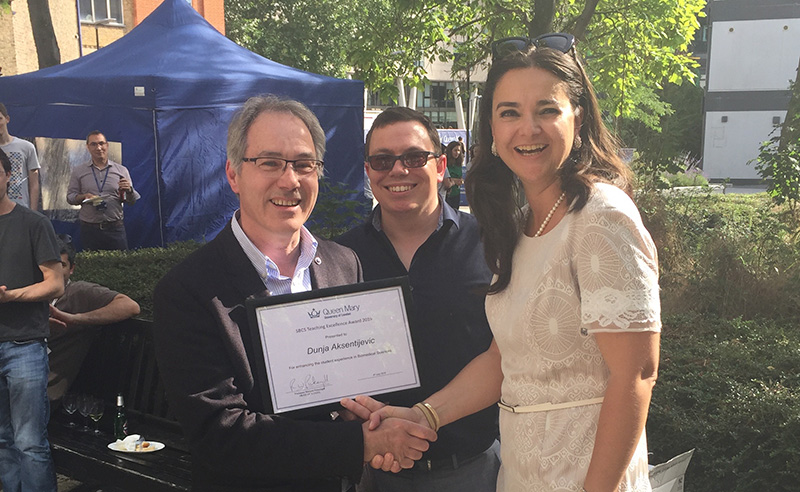Meet the Lecturer – Dunja Aksentijevic
In this Meet the Lecturer blog, we spoke to School of Biological and Chemical Sciences (SBCS) Lecturer in Physiology and Biochemistry Dr Dunja Aksentijevic. She discusses her passion for teaching, the Aurora Leadership Programme and her research into a new drug to target heart metabolism in type II diabetes and obesity.

What do you enjoy most about your role?
I enjoy the contact with students. I am a research scientist at heart as that has been my training for the past fifteen years. However, I was always involved in teaching and I can’t imagine my academic career without working with undergraduate students. I find this part of my job quite refreshing and their inquisitive minds invigorating because it makes me think on my toes and remember why I became a scientist in the first place. Research success cannot replicate the same feeling. It’s really rewarding to have students come to you tell you how much they’ve enjoyed your lectures and how you’ve helped them consider a new career path. You’re not just passing on knowledge, you’re helping to train a new generation of scientists and critical thinkers, which helps students no matter what they decide to do in the future.
You recently received the SBCS Teaching Award in Biomedical Sciences. What teaching skills and methods helped you to achieve this?
Contrary to the increasing separation in higher education of research and teaching, my mentor Professor Michael Shattock, eminent British physiologist and Queen Mary alumni, who won many teaching excellence awards during his career at King’s College London, taught me that excellent scientists make excellent teachers. I’m very passionate about what I do, so regardless of whether I’m teaching a topic I’m specifically research trained in or not, I like to bring that perspective to my students. So we’re not just reciting a dry fact in the classroom, I try to ask the students why we should care about it. I ask them to take the knowledge, which they have to learn, and fit it into the world and the challenges around them. We can’t push the frontiers of human knowledge without this kind of attitude and it’s very important that we install passion in our students, not just train them to answer exam questions to obtain a degree. Student value and recognise professionals who are passionate and believe in what they are preaching. If you’re able to get students interested in the topic you’re teaching, they are more likely to learn more productively and it is a more enjoyable experience.
You have also been accepted onto the Aurora Women’s Leadership Development Programme for 2019-20. What are you hoping to learn from the programme?
I’m very grateful for the opportunity to join the Aurora Leadership programme. I must say that unlike at some leading UK universities, at SBCS and Queen Mary I have had a positive experience in terms of treatment of women in STEM. However, there is always room for improvement and these kinds of programmes are very positive. I hope the programme will help to give me additional confidence, training, awareness and contacts as I continue to build my academic career. The programme will help me develop the required skills and critical thinking skills needed to rise up to any leadership challenge I might face in the future.
Tell us more about your research
I have had some very exciting research leads and breakthroughs in my time at Queen Mary. I have teamed up with Astra Zeneca, who are my research partners, to find a new drug targeting systemic inflammation in type II diabetes and obesity to improve cardiac outcomes. The aim is to combat the huge explosion of obesity and diabetes, which have links to heart disease, one of the primary causes of death in the UK. We know there is a link between the two, but we need to know how to tackle this problem. Professor Federica Marelli-Berg, who is Head of Biochemical Pharmacology at Queen Mary’s William Harvey Institute and leading expert on inflammation, has taken on board some of the ideas I’ve had and we are collaborating with Astra Zeneca. We are trying to use a drug to target metabolism of inflammatory cells to improve cardiac function in type II diabetes and obesity. At this stage it’s looking promising but we will have to see how it goes.
I’ve been very fortunate to work with some excellent biologists at Queen Mary in Professor Stephen Rossiter and Dr Chris Faulkes, who work with fascinating organisms. I’ve been able to bring my experience in muscle metabolism to their fields, which has led to some very interesting research collaborations, looking at the metabolism of the species they are interested in, in relation to evolution and ecology. Therefore, there is a lot of potential for exciting future collaborations within SBCS.